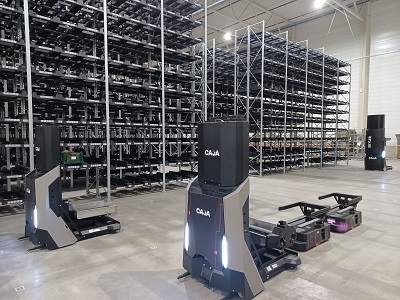Dropshipping meaning & comparison to fulfilment
What is dropshipping? Dropshipping is a business and logistics model in e-commerce where retailers sell products without storing or shipping them themselves. The key point: in dropshipping, an external provider – usually the manufacturer or wholesaler – takes care of the entire logistics process. This means that the online shop only provides the platform, while storage, order picking and shipping are carried out by third parties.
This contrasts with traditional fulfilment, where retailers have their goods delivered to a central warehouse, for example by a logistics service provider such as GLS. From there, the entire shipping process is handled, but the goods remain the property of the retailer. While fulfilment is designed for control, service quality and transparency, dropshipping scores points above all with low start-up costs and low logistical effort.

Dropshipping – Definition and significance in online retail
The definition of dropshipping is simple: it is a sales model in which the retailer offers products in their online shop but does not store or ship them themselves. As soon as a customer places an order, the retailer forwards the order to a third-party provider. This provider then ships the order directly to the customer.
Dropshipping therefore describes the logistical part of this model – from storage to shipping – which takes place completely outside the retailer's own company. The significance of dropshipping lies primarily in its flexibility: retailers can offer a wide range of products without having to tie up capital in inventory.
However, control over packaging, shipping times and returns is limited. This can be a challenge for companies that focus on high customer satisfaction and brand perception. In this case, shipping via a fulfilment centre is the ideal choice: you benefit from the advantages of dropshipping – such as reduced storage and shipping costs – while retaining control over your logistics.
The difference between dropshipping and fulfilment – which model suits your business?
The fundamental difference between dropshipping and fulfilment lies in the responsibility and control over logistics processes:
- With dropshipping, the entire logistics process takes place outside the company. The retailer has little influence over shipping times, packaging or returns processing.
- With fulfilment, as offered by GLS, the goods are stored in a warehouse in our logistics network. We then take care of the entire process – including fast delivery, professional packaging and returns management.
For retailers who value reliable delivery processes, transparency and maximum control, fulfilment is usually the more sustainable choice. It provides a stable foundation for scalable growth and consistent quality control throughout the entire customer journey.
Become a fulfilment partner of GLS
Comparison: Dropshipping and fulfilment
| Advantages | Dropshipping | Fulfillment |
|---|---|---|
|
Fast delivery times & shipping quality
|
|
|
|
Customised packaging & branding
|
|
|
|
Quality control & returns management
|
|
|
|
Scalable during peak times
|
|
|
|
Ownership of the products (inventory sovereignty)
|
|
|
|
Outsourcing of logistics processes
|
|
|
|
Focus on your own core competencies
|
|
|
|
Low start-up capital required
|
|
|
|
Wide range without capital commitment
|
|
|
|
Acts solely as a platform operator
|
|
|
Summary
The fundamental difference between dropshipping and fulfilment lies in the responsibility and control over logistics processes:
- Dropshipping enables an uncomplicated entry into e-commerce with comparatively low capital requirements. In theory, retailers can offer a very wide range of products, as no upfront investment in goods is necessary. The entire logistics process is outsourced, which saves resources and allows retailers to focus on sales. But this freedom comes at a price: control over delivery times, packaging quality and customer service is limited, which can be a disadvantage, especially in highly competitive markets.
-
With fulfilment, retailers benefit from fast delivery, high-quality shipping and individual branding through professional logistics partners. Having their own inventory enables reliable quality control and efficient returns management. Especially during peak periods, the model is easily scalable and offers the highest service levels. Although higher start-up capital is required, it results in strong customer loyalty and sustainable brand building.
GLS fulfilment service: your advantages at a glance
With GLS's fulfilment service, you as a retailer have access to your stock at all times, can flexibly control shipping processes and benefit from short delivery times – throughout Europe. Unlike with dropshipping, you know exactly how your goods are packaged and when they are shipped. This helps you build trust with your customers and secures a clear competitive advantage. Our service is particularly suitable for growing e-commerce companies that want to outsource their logistics process without losing control.